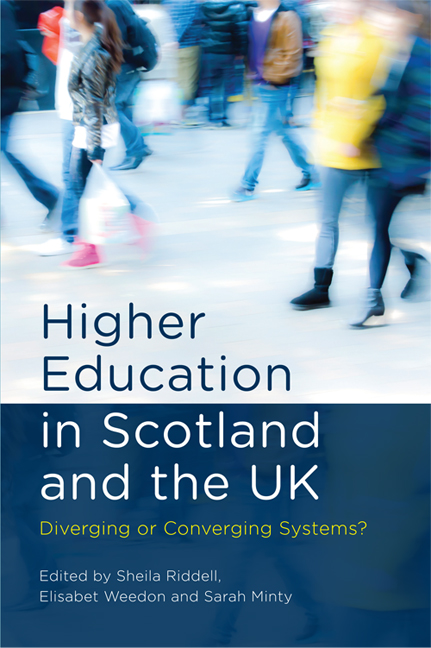Book contents
- Frontmatter
- Contents
- Figures
- Tables
- Acknowledgement
- The Contributors
- Dedication
- 1 Scottish Higher Education and Devolution
- 2 Higher Education Governance and Institutional Autonomy in the Post-devolution UK
- 3 Student Funding in the UK: Post-Devolution Scotland in a UK Context
- 4 Young People–s Attitudes towards Student Debt in Scotland and England
- 5 Cross-border Flows of Students within the UK
- 6 Widening Access to Higher Education in Scotland, the UK and Europe
- 7 The Internationalisation of Higher Education in Scotland and the UK
- 8 Research Policy in Scotland and the Rest of the UK
- 9 Devolution and Higher Education Policy: Negotiating UK and International Boundaries
- Appendix 1 Research Methods
- Appendix 2 List of Acronyms
- Index
4 - Young People–s Attitudes towards Student Debt in Scotland and England
Published online by Cambridge University Press: 05 August 2016
- Frontmatter
- Contents
- Figures
- Tables
- Acknowledgement
- The Contributors
- Dedication
- 1 Scottish Higher Education and Devolution
- 2 Higher Education Governance and Institutional Autonomy in the Post-devolution UK
- 3 Student Funding in the UK: Post-Devolution Scotland in a UK Context
- 4 Young People–s Attitudes towards Student Debt in Scotland and England
- 5 Cross-border Flows of Students within the UK
- 6 Widening Access to Higher Education in Scotland, the UK and Europe
- 7 The Internationalisation of Higher Education in Scotland and the UK
- 8 Research Policy in Scotland and the Rest of the UK
- 9 Devolution and Higher Education Policy: Negotiating UK and International Boundaries
- Appendix 1 Research Methods
- Appendix 2 List of Acronyms
- Index
Summary
INTRODUCTION
Whilst participation rates in higher education have increased rapidly since the 1960s, the most selective universities across the UK continue to be dominated by young people from the most socially advantaged backgrounds (Raffe and Croxford, 2015). Successive Scottish and UK Governments have stressed the need for increased participation in higher education in order to meet the needs of a knowledge economy, but have also emphasised the need for fairer access in order to increase social mobility. Since 1997 there has been a growing expectation that students and their families will make a significant contribution to the cost of higher education by shouldering part of the burden of tuition fees and living expenses. This policy has led to anxiety that students from poorer backgrounds, who are already under-represented, may be deterred from accepting a university place. Indeed, as discussed in Chapter 3, the danger of deterring poorer students was the main justification for the abolition of the graduate endowment in Scotland in 2007. However, we know very little about Scottish young people's views of this important issue, and whether their views are distinctively different from those of young people living in England.
This chapter begins with an overview of the literature on UK attitudes to tuition fees and student debt. It then draw[s] on interviews with young people in Scotland and England, undertaken as part of the ESRC project, to explore views of fees regimes in different parts of the UK, contrasting the attitudes and awareness of those from more and less socially advantaged backgrounds.
As described more fully in Appendix 1, interviews were conducted with 121 young people aged 14 to 19 from across Scotland and twenty-seven from the north of England (148 interviews in total). Most young people who agreed to be interviewed were planning to enter higher education, either via university or college routes. All interviewees were asked for the postcode of their family home, which was classified according to the Scottish Index of Multiple Deprivation (SIMD) or the Income Deprivation Affecting Children Index (IDACI). SIMD and IDACI are measures of neighbourhood rather than individual deprivation, with 1 being the most deprived and 5 being the least deprived area. There is a strong association between individual and neighbourhood deprivation, although of course not all families living in areas of deprivation are low income and vice versa.
- Type
- Chapter
- Information
- Higher Education in Scotland and the UKDiverging or Converging Systems?, pp. 56 - 70Publisher: Edinburgh University PressPrint publication year: 2015



